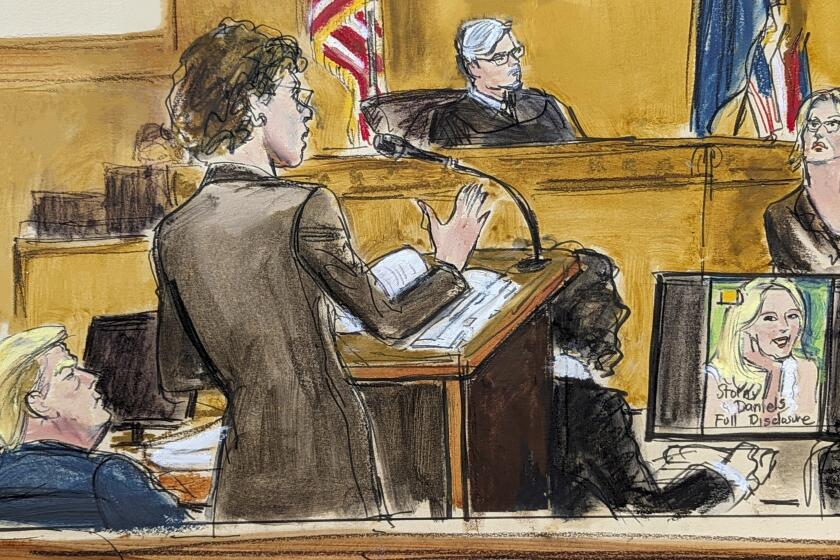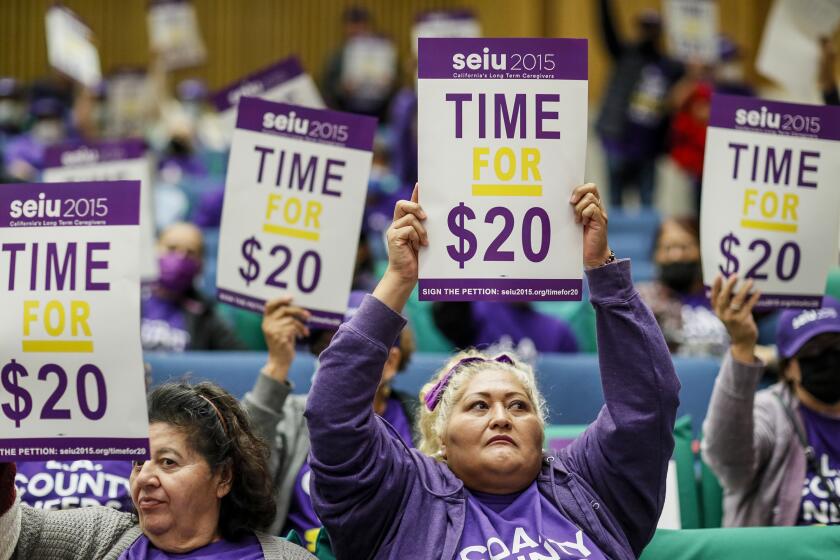Tough Crime Bill OKd by Senate in 94-6 Vote : Law: Legislation would expand death penalty and weapons ban. It also stiffens prison terms for S&L; fraud.
The Senate approved a massive anti-crime bill loaded with election-year appeal Wednesday, voting overwhelmingly to reinstitute the federal death penalty, restrict Death Row appeals, ban some assault weapons and toughen the prosecution of savings and loan fraud.
The sweeping fraud provisions, developed this week by a bipartisan group, would imprison crooked “S&L; kingpins” for up to life, expand the use of the potent Racketeer Influenced and Corrupt Organizations Act and authorize $528.5 million for hundreds more prosecutors and investigators.
The omnibus anti-crime package, passed on a 94-6 vote, is similar to measures moving through the House. It would furnish $332 million for even more federal law enforcement agents and grant $900 million to assist state and local drug-fighting efforts. Such sums, of course, must be appropriated by Congress in separate legislation.
Among numerous other provisions, the bill also would offer $400 million in college scholarships to students who promise to work for local police departments for four years after graduation.
The legislation was approved after Democrats and Republicans maneuvered for nearly two months in an effort to demonstrate which side is tougher on crime, an issue at the top of many voter surveys.
“This is a much tougher bill than when it began,” declared Sen. Strom Thurmond (R-S. C.), referring to the original measure sponsored by Sen. Joseph R. Biden Jr. (D-Del.), chairman of the Senate Judiciary Committee.
Biden called the finished version “the toughest, most comprehensive crime bill in our history,” reshaped by amendments from members of both parties.
The senator assailed President Bush for calling the original Biden measure “a sheep in wolf’s clothing,” asserting that the Senate-passed bill is much broader than a proposal made by Bush last year.
The partisan bickering flamed hottest on the S&L; issue, with senators fearing voter backlash as the federal cost of bailing out collapsed institutions reaches an estimated $500 billion over 30 or 40 years.
Senate Democrats had hoped to push through a fraud prosecution package far exceeding a 1989 Bush request, underscoring their accusations that Republican administrations are to blame for the crisis.
But Bush made a preemptive strike last month, announcing with fanfare his own expanded bundle of enforcement measures, as Senate GOP leaders simultaneously accused the Democratic-controlled Congress of responsibility for the S&L; scandals.
Eventually, a bipartisan group headed by Sens. Timothy E. Wirth (D-Colo.) and John Heinz (R-Pa.) met with Justice Department officials and put together the package that was wrapped into the anti-crime bill. The major provisions would:
--Enable federal prosecutors to bring criminal and civil actions under the RICO statute for eight additional bank fraud offenses.
--Authorize wiretapping in investigations of bank fraud.
--Imprison S&L; “kingpins” for 10 years to life and fine them as much as $20 million. A kingpin is someone who, in concert with at least three others, illicitly gains more than $5 million over a two-year period.
--Impose mandatory minimum sentences in cases of fraud involving more than $1 million against federally insured S&Ls;, banks and credit unions.
--Increase maximum penalties for bank fraud and embezzlement from 20 to 30 years.
--Elevate the fight against S&L; fraud by establishing a special counsel in the attorney general’s office to coordinate investigations and prosecutions.
--Reduce barriers to restitution for victims of financial fraud.
--Deny bankruptcy protection to officers of federally insured institutions who are fined or required to pay restitution for fraud.
--Pay rewards of up to $500,000 for information leading to the recovery of fraudulently obtained assets.
Heinz said that the measure is “designed to recover funds for the American taxpayer and to punish those who treated federally insured savings and loans like a personal piggy bank.”
Sen. William L. Armstrong (R-Colo.), who cast the only vote against the S&L; package, protested that it was a politically inspired overreaction to a problem caused not by “a few unscrupulous businessmen” but by a system established by Congress. He called the stiffened penalties, especially under RICO, “extreme.”
In moving to reinstitute the federal death penalty 18 years after it was struck down, the Senate provided safeguards required by the Supreme Court in its 1972 ruling.
The bill expands the death penalty to cover 33 crimes, including murder, espionage, treason, aircraft hijacking, kidnaping, hostage taking and operations by “drug kingpins.”
The bill also overhauls the habeas corpus system under which state and federal Death Row inmates have been able to reverse their sentences or delay execution for years. The revisions are aimed at limiting action on appeals to one year.
The most controversial feature of the bill would expand a ban on military-style assault weapons.
Atty. Gen. Dick Thornburgh expressed hope Wednesday that the proposed extension would be eliminated in the House, where he said there is strong opposition.
Thornburgh said that the Administration would prefer stiffer penalties for firearms crimes. He did not indicate whether he would recommend a veto if the final bill contains an assault weapons ban.
Both California senators, Democrat Alan Cranston and Republican Pete Wilson, who is running for governor, voted for the anti-crime bill.
BACKGROUND
Last summer, President Bush banned the importation of 47 models of military-style assault weapons but both he and the National Rifle Assn. strongly oppose the provision in the new omnibus anti-crime package that would extend the ban to 14 other models, mostly American-made.
More to Read
Get the L.A. Times Politics newsletter
Deeply reported insights into legislation, politics and policy from Sacramento, Washington and beyond. In your inbox three times per week.
You may occasionally receive promotional content from the Los Angeles Times.






